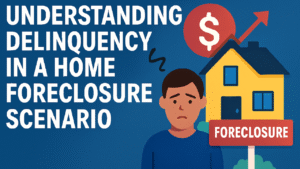 Understanding Delinquency in a Home Foreclosure Scenario
Understanding Delinquency in a Home Foreclosure Scenario
When it comes to owning a home, few words are as alarming as foreclosure. It’s a word that evokes anxiety, fear, and uncertainty. At the heart of most foreclosure proceedings lies another crucial term: delinquency. Understanding what delinquency is, how it begins, and what it can lead to is essential for any homeowner—or prospective one. In this post, we’ll explore delinquency in the context of home foreclosure, break down the stages, and offer some insights into what homeowners can do if they find themselves slipping behind on mortgage payments.
What is Delinquency?
In the mortgage world, delinquency occurs when a homeowner fails to make a scheduled mortgage payment by its due date. Most lenders offer a short grace period—typically around 15 days—but after that, the loan is officially considered delinquent.
Delinquency isn’t just a missed payment. It’s the first red flag that alerts the lender something may be wrong. From this point forward, the clock starts ticking, and without proper intervention, delinquency can snowball into something much more serious: foreclosure.
Stages of Mortgage Delinquency
Delinquency progresses in stages, each with increasingly serious consequences:
- 30 Days Late:
This is the first stage of delinquency. The homeowner has missed one full payment cycle. At this point, the lender will typically report the delinquency to credit bureaus, which can negatively affect the homeowner’s credit score. Communication from the lender often ramps up, with reminders, warnings, and sometimes offers of assistance. - 60 Days Late:
By now, two payments have been missed. The situation becomes more critical. The lender might send more formal notices, and credit damage becomes more pronounced. Some lenders may begin discussing options like forbearance or loan modification at this point. - 90 Days Late:
With three missed payments, the loan is considered to be in serious delinquency. The lender will generally issue a Notice of Default (NOD), formally beginning the foreclosure process in some states. Legal fees and additional penalties might also begin to accrue. - 120+ Days Late:
At this point, most lenders are legally permitted to begin foreclosure proceedings if no payment plan or resolution has been agreed upon. The home may be scheduled for a foreclosure sale, and the homeowner risks losing the property.
Why Homeowners Fall Into Delinquency
Delinquency doesn’t usually stem from irresponsibility. In many cases, it’s the result of life events that strain finances:
- Job loss or reduction in income
- Medical emergencies
- Divorce or separation
- Unexpected expenses
- Natural disasters
These situations can quickly make it difficult to keep up with monthly mortgage payments, especially if the homeowner doesn’t have an emergency fund.
Impact of Delinquency
Beyond the risk of foreclosure, mortgage delinquency affects homeowners in several profound ways:
- Credit Damage: A delinquent mortgage can stay on your credit report for up to seven years, impacting your ability to qualify for future loans or credit cards.
- Stress and Uncertainty: The emotional toll of fearing the loss of one’s home can be overwhelming for families.
- Legal and Financial Costs: Delinquency can lead to added fees, interest, and legal costs that make catching up even harder.
Options for Homeowners
Fortunately, homeowners aren’t without options. If you find yourself behind on mortgage payments, here are steps you can take:
- Communicate with Your Lender: Don’t ignore notices or calls. Many lenders offer hardship programs or may work with you on a repayment plan or loan modification.
- Explore Forbearance: This allows you to temporarily pause or reduce payments. However, missed payments will still be due later.
- Consider Refinancing or a Short Sale: If you qualify, refinancing may lower your monthly payments. In other cases, selling the home before foreclosure may be the best way to avoid long-term financial damage.
- Seek Professional Help: Housing counselors approved by HUD (U.S. Department of Housing and Urban Development) offer free or low-cost advice. They can help you understand your rights and explore options.
- Bankruptcy: In some situations, filing for bankruptcy may delay or prevent foreclosure, but this should only be considered after consulting with a legal expert.
Final Thoughts
Delinquency is often the first step toward foreclosure, but it doesn’t have to end that way. With timely action, honest communication, and the right resources, many homeowners can avoid losing their homes. If you’re struggling, don’t wait—reach out for help as soon as you sense trouble. The sooner you act, the more options you’ll have to regain control of your financial future.